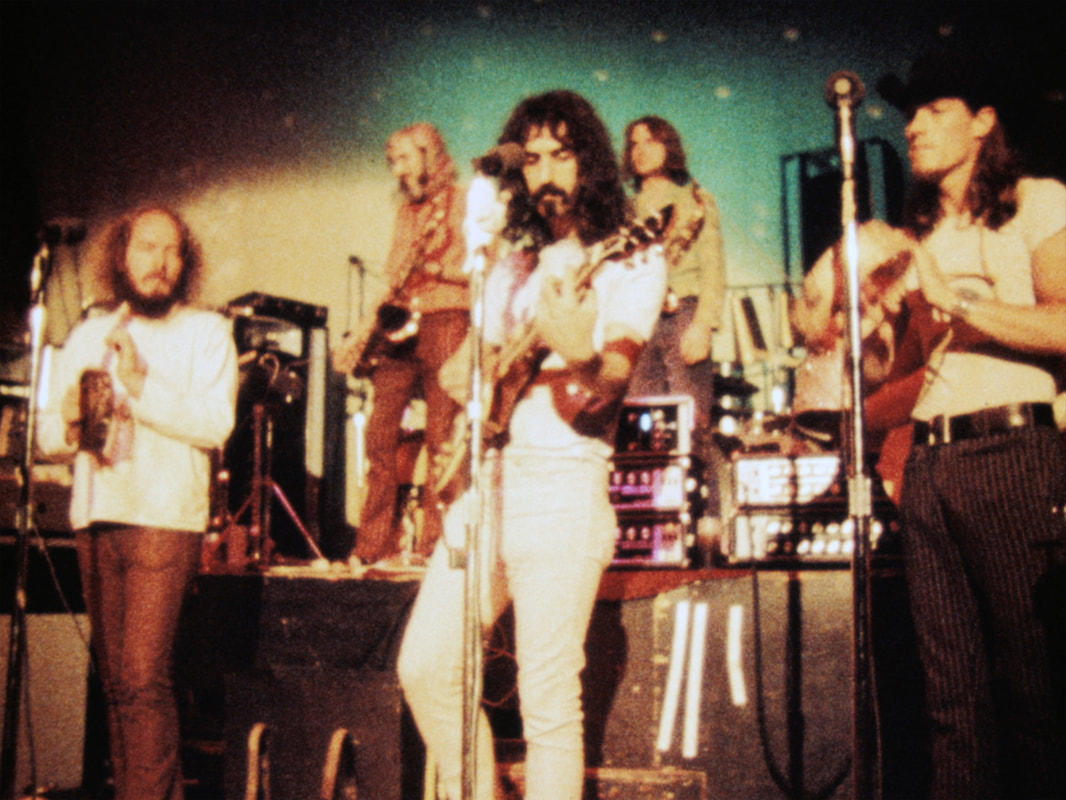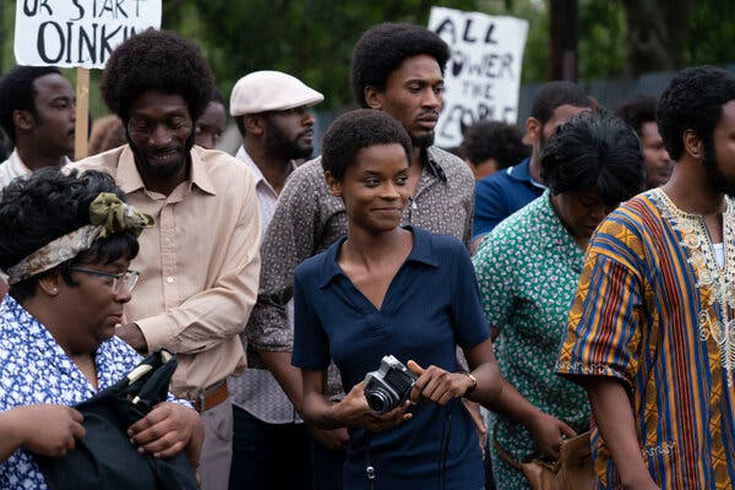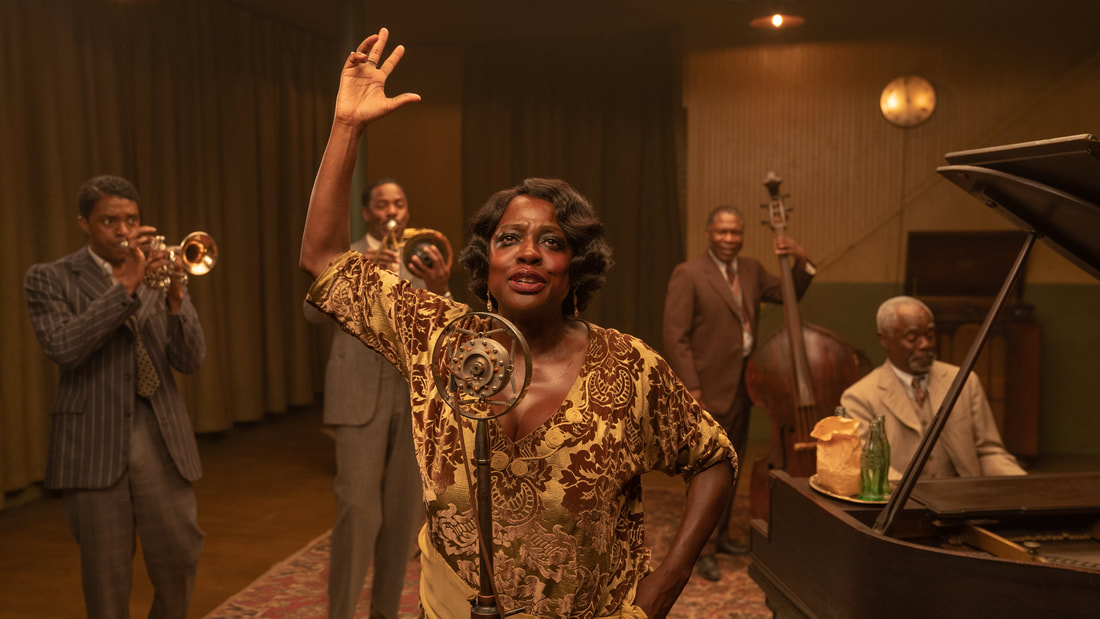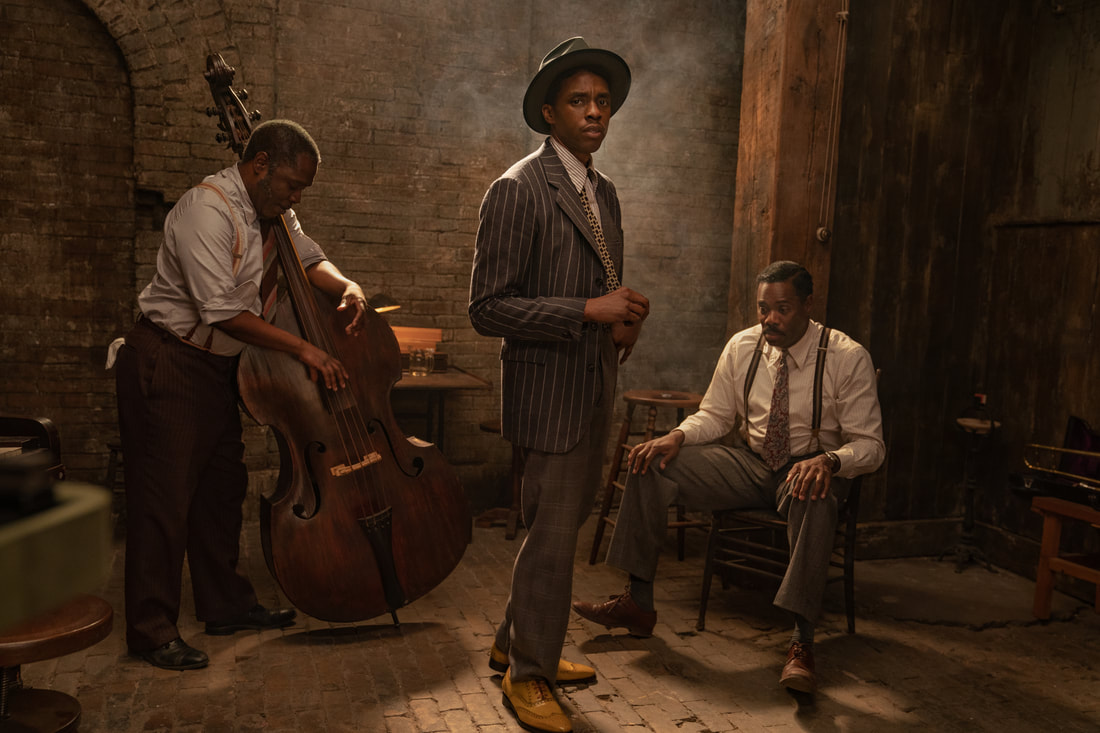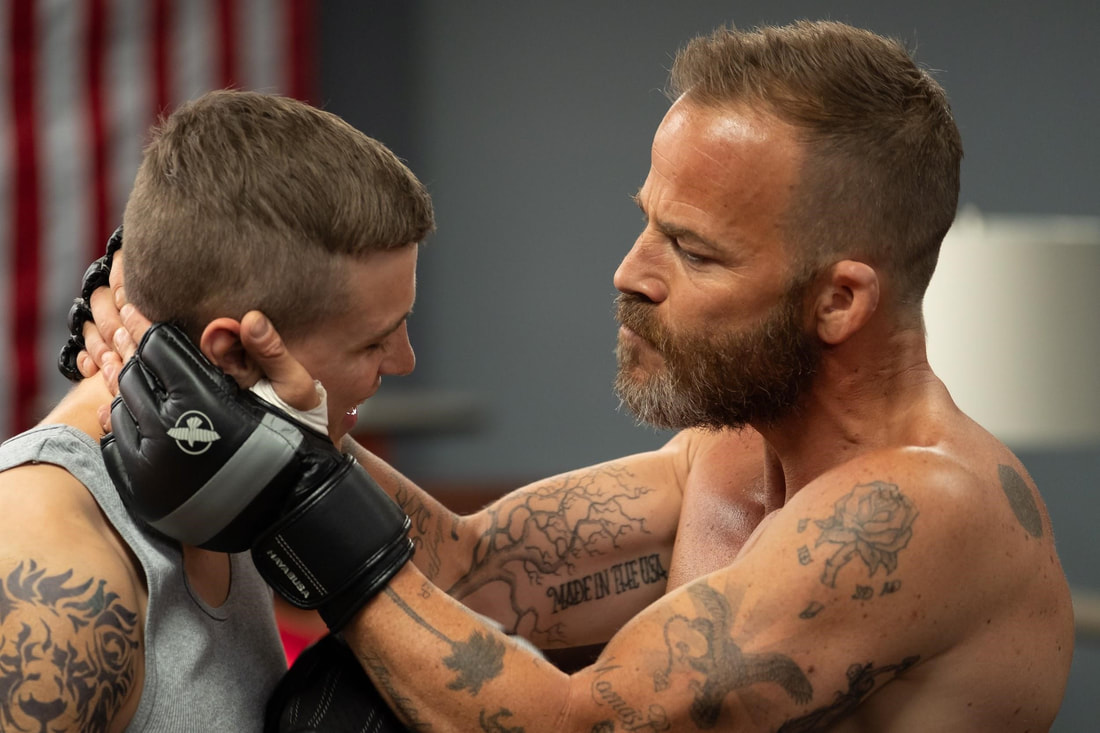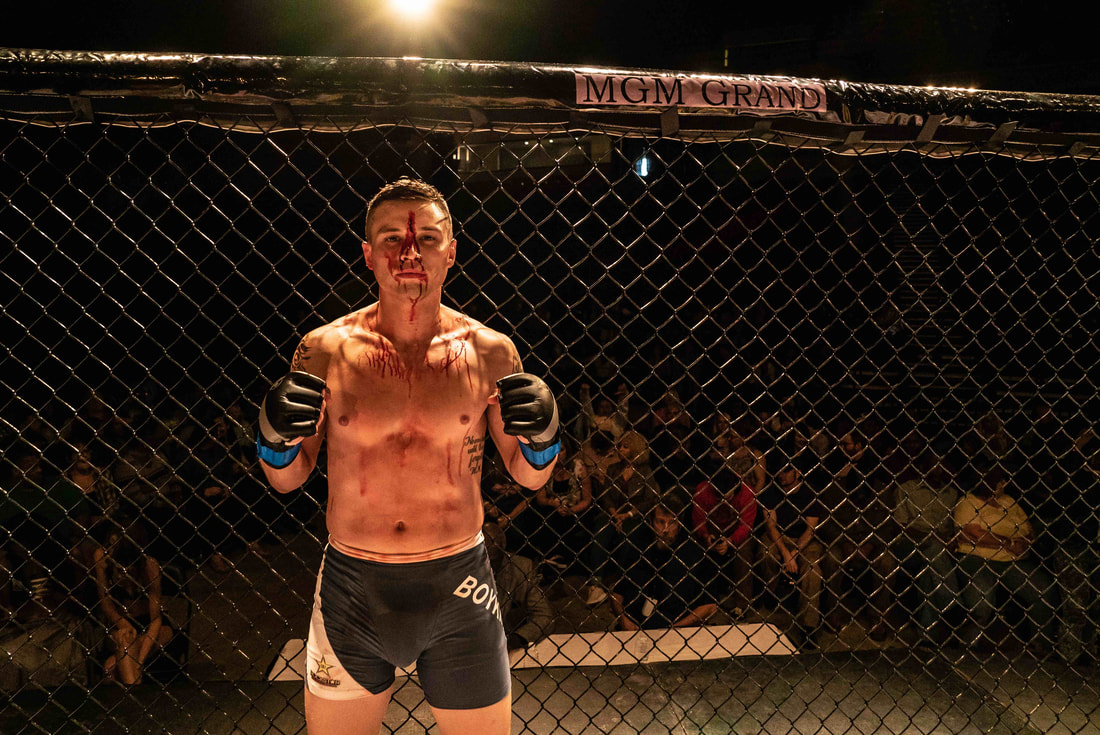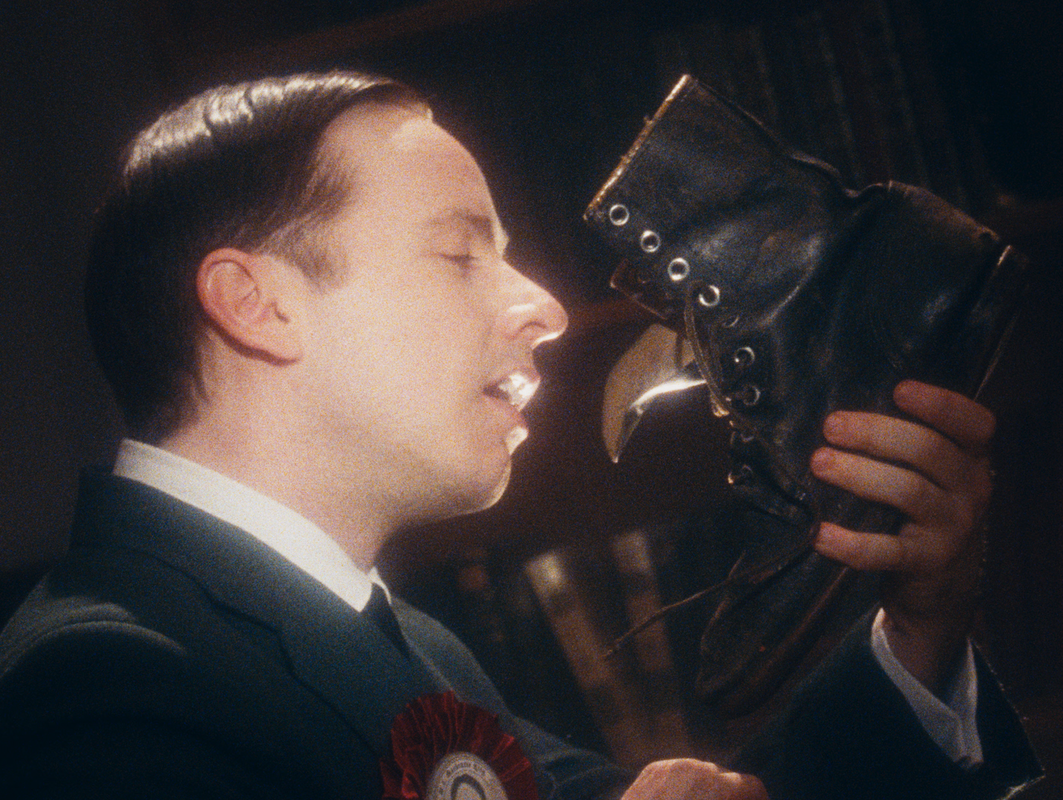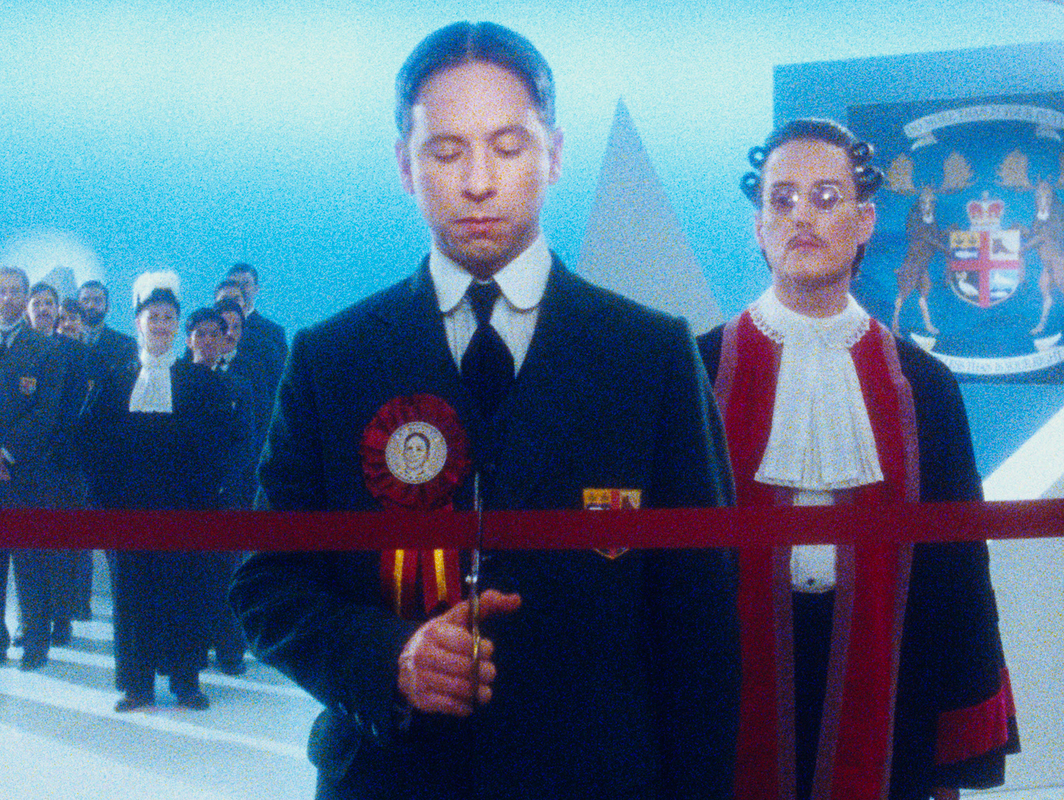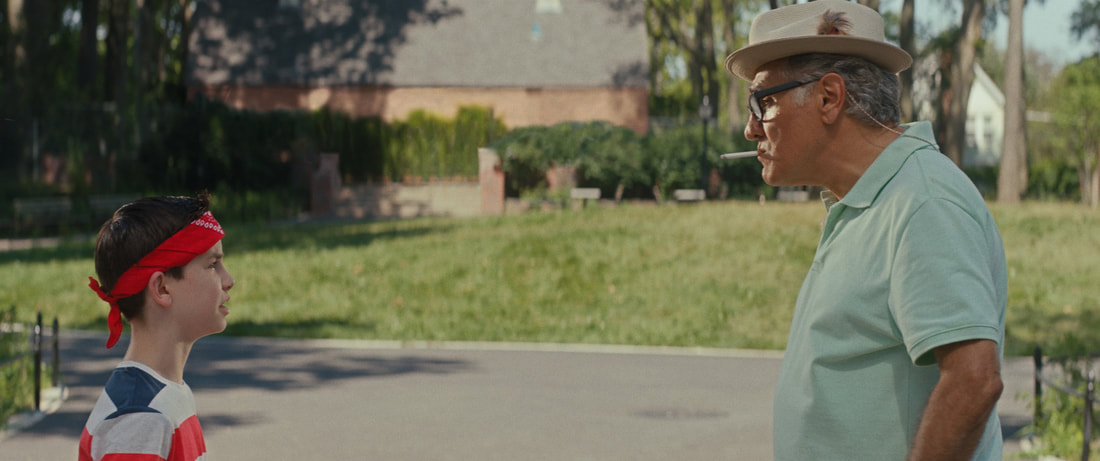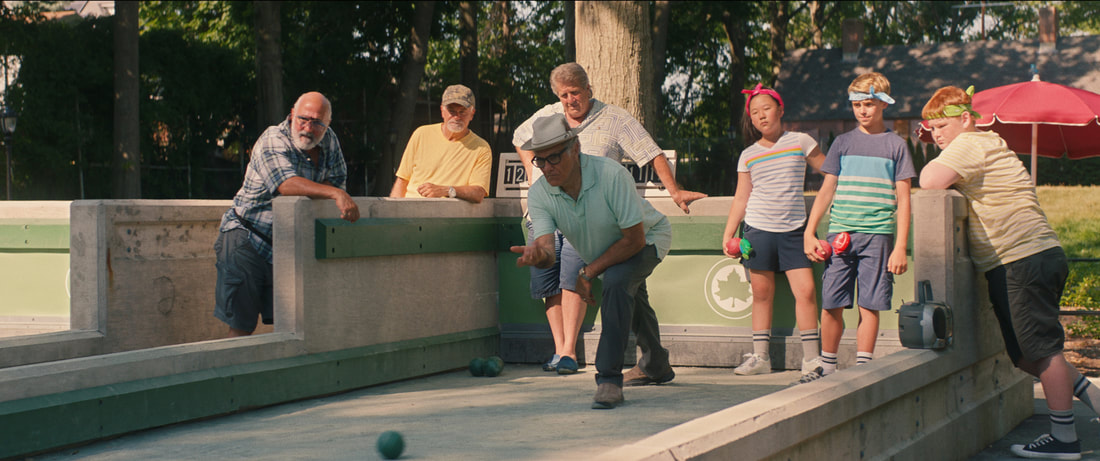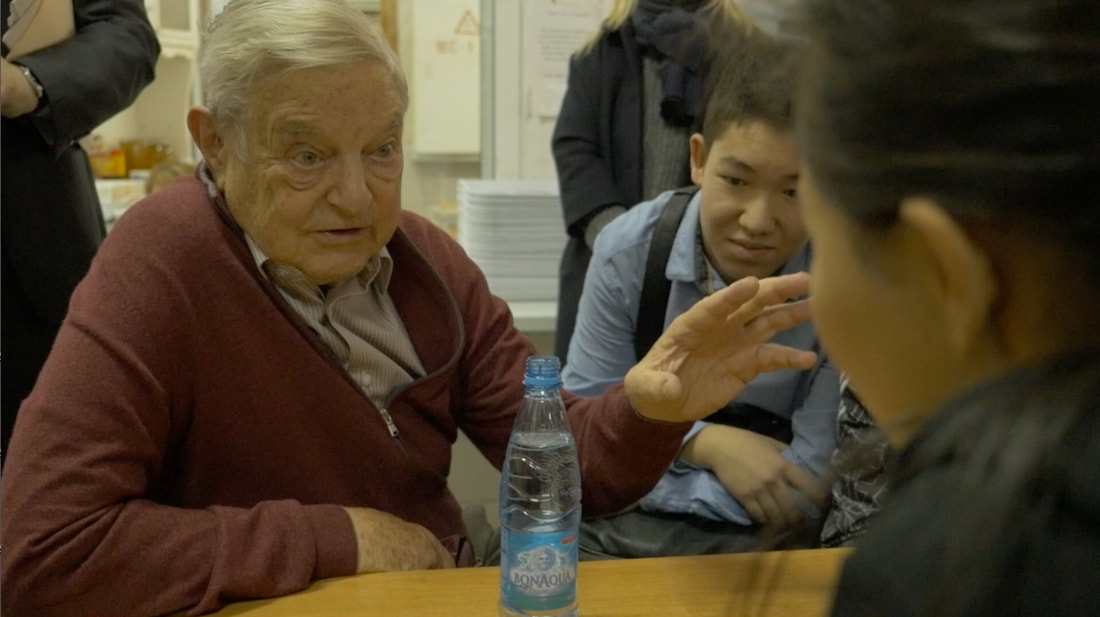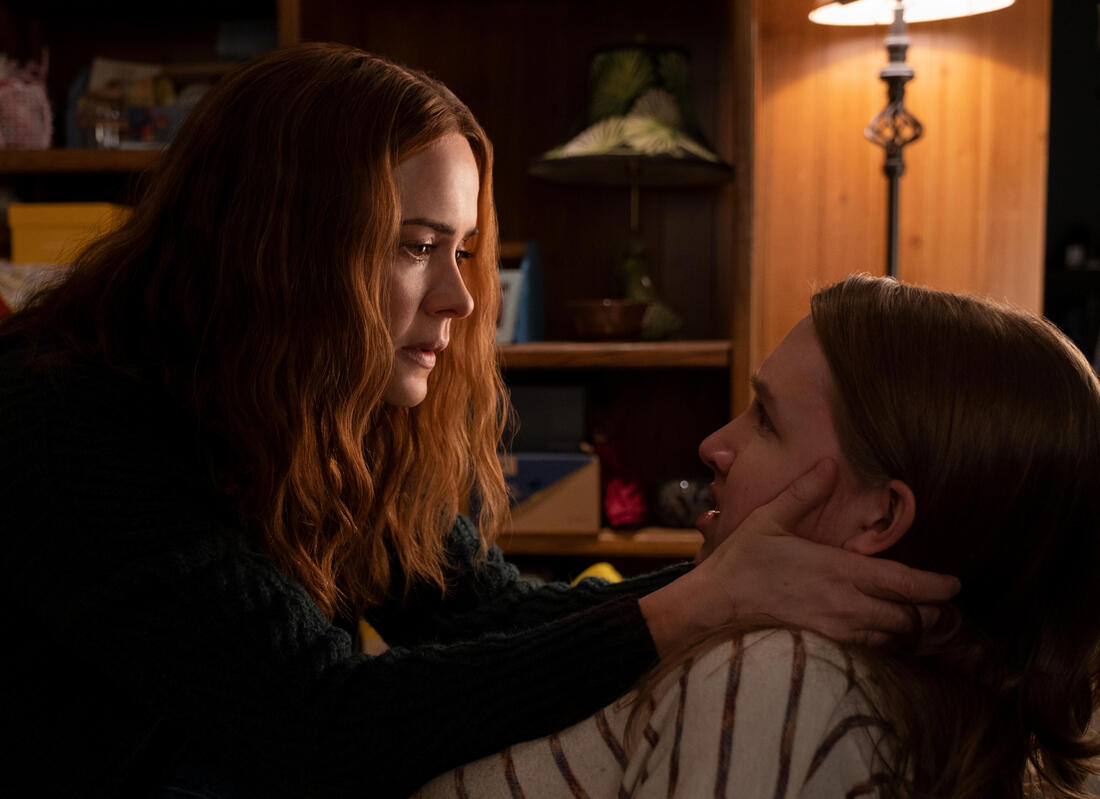|
Review by Sean Boelman
When one thinks of musicians that are frequently misunderstood, no name should come to mind as quickly as Frank Zappa. Wonderfully capturing the artist’s eccentricities and preserving his legacy, filmmaker Alex Winter’s Zappa is an excellent biographical documentary, avoiding many of the issues that often plague the genre.
In the movie, Winter presents Zappa’s life story with a particular focus on his hugely eclectic music career. As is the case with most music documentaries, this is going to be best enjoyed by those who are already familiar with the subject, although the film isn’t overly dependent on nostalgia to have an effect. At over two hours, the movie runs longer than most in the genre, but Winter is able to justify the length. Zappa is by no means a conventional rock star, and so while there are a few moments that focus on traditional behind-the-scenes drama, there is also a lot more to his story than that, the result being unsurprisingly compelling. There is something to be said in the film about self-expression. One of the things that made Zappa so well-known is that he was so unabashedly himself, and he was going to do whatever he wanted without concern for whatever anyone else thought. And this unorthodox personality really shines through in the movie.
One of the things that stands out about Winter’s approach is that he approaches Zappa not only as a musician, but also as a songwriter and composer. Winter isn’t just concerned with the music that made Zappa popular — he is also interested in his more obscure and experimental work that has the tendency to fly under the radar.
The film features interviews with people who worked with or studied Zappa, but the true star of the show here is the use of archive materials. Like many musicians in the era, Zappa kept a pretty extensive collection of footage from his life and career, and Winter is able to assemble it into a narrative quite well. This archive footage takes a few different forms. Some clips are interviews with Zappa himself, poetically discussing the philosophy with which he approached his life and work, and others are recordings of performances that allow the audience to see these ideas in action. The balance that is struck between the two allows the movie to stay pretty consistently entertaining. Zappa works both as a loving tribute to the musician and one of the most effective uses of archive materials in recent memory. Music fans looking for a documentary that is more than nostalgia will find themselves pleased by this portrait of the unconventional man. Zappa hits theaters and VOD on November 27. Rating: 4/5
0 Comments
Review by Sean Boelman
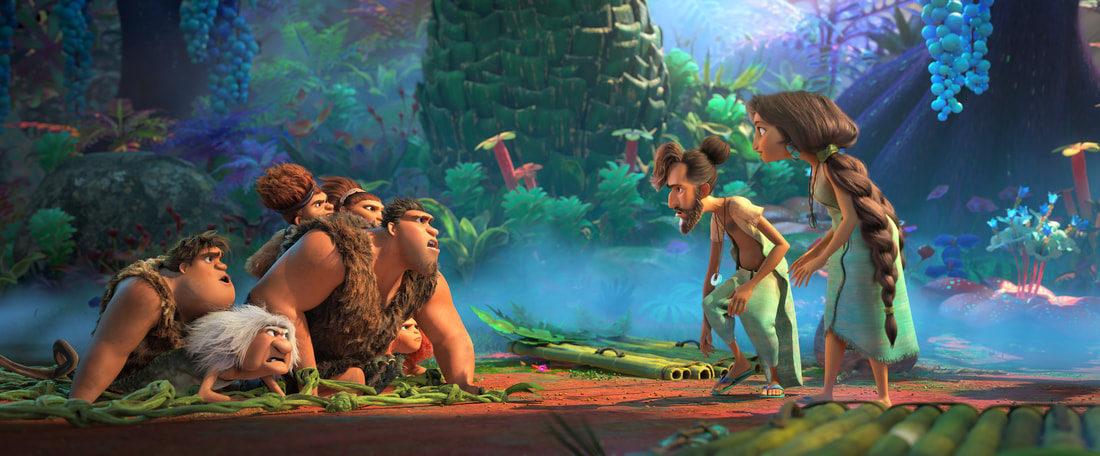
The Croods (left) meet The Bettermans (right) in DreamWorks Animation's The Croods: A New Age, directed by Joel Crawford. The Croods (from left): Thunk (Clark Duke), Gran (Cloris Leachman), Sandy (Kailey Crawford), Grug (Nicolas Cage), Ugga (Catherine Keener) and Eep (Emma Stone). The Bettermans (from near right): Phil (Peter Dinklage) and Hope (Leslie Mann). Photo Credit: DreamWorks Animation LLC.
On top of all of the other challenges it faces, The Croods: A New Age also must deal with the fact that it is coming out seven years after its predecessor, meaning that a majority of its target audience has already aged out. Still, thanks to a charming voice cast and some legitimately funny gags, this manages to be a very enjoyable family film.
The movie follows the eponymous neanderthal family as they find their original way of life changing, then meet a more evolved family who threatens to bring their world crashing down. This conflict between old and new is nothing particularly original, but applying it to this cavemen versus civilization set-up provides for some great comedic hijinks. Admittedly, this may not be as deep or substantial as some other animated movies aimed at younger audiences, but there’s still a very good message about growing up and growing into oneself. Yes, this is buried beneath layer upon layer of physical comedy, but it’s pretty heartwarming at its core. For much of the first two-thirds, the film is playful and goody, showing the Croods and Bettermans competing and trying to outwit each other, and this is where a majority of the movie’s most successful moments come. When a more firm action-oriented plot begins to kick in during the final third, the cadence of the jokes slows down quite a bit.
Rather than expanding upon the dynamic between the existing characters, the film mostly focuses on the leads and new characters. Ugga, Gran, and Thunk are all relegated to the sideline as the writers obviously take more of an interest in the stories of Eep, Guy, Grug, and the Bettermans.
New additions to the voice cast include Peter Dinklage and Leslie Mann, both of whom are quite funny, and Kelly Marie Tran, who is extremely underused. As for the returning cast, they are all still great even though many of them have become significantly more popular since 2013, and they are clearly having a lot of fun in their roles. The animation of the movie is very good, with even more of an investment put into world-building. It’s a colorful, energetic animated film, which will catch the eye of younger viewers, and the wit of the script will keep their adult companions entertained. The soundtrack is also wonderful, including a great cover of “I Think I Love You” from Tenacious D. It took quite a while for The Croods: A New Age to make its way to the screen, but it turns out that it may have been worth the wait. Funny and energetically animated, this is a lot more enjoyable than anyone would have expected. The Croods: A New Age opens in theaters on November 25. Rating: 4/5 Review by Dan Skip Allen Major League sports are a dream for kids all of the world and in the United States. The dream of playing a professional sport is attainable if one puts in the hard work and the cards fall in their favor. The pyramid of sports is an idea that everybody starts at the bottom and works their way to the top. Those that make it to the top are the few and in between. It's not easy to make it to the top in any field, let alone the field (or court) of sports. The Last Out focuses on three aspiring Cuban baseball players who are trying to achieve their dreams of becoming a player in the MLB. Sami Khan and Michael Gassert are the writers/directors of The Last Out. They chose to focus their cameras on three Cuban baseball players, Victor Baro, Carlos O. Gonzalez, and Happy Oliveros, to document their journey from the communist country of Cuba to Costa Rica and beyond. Two are pitchers and one is a position player and hitter. With the help of an ostracized sports agent, Gus Dominguez, they hope to achieve the American dream of being a major league ballplayer. Cuba is a country where baseball is a huge deal. The problem is young aspiring ballplayers can't make it in their home country because of socialism. They can't get rich playing ball in Cuba, so they go elsewhere to make their dream come true, like the Dominican Republic, Venezuela, and Costa Rica. These kids turned adults have to work extremely hard just to get tryouts and showcases for scouts. It's not a sure thing they will get signed for a contract either. They have a two-year window to achieve their goal or it's all but over for them. Some give up after trying for a while and others keep fighting for a while. It all depends on how much they want to succeed. The film shows these three guys and all the levels of what they have to go through for success. Success could just be coming to America for a new life or it could be settling for playing a lesser form of baseball still fighting for the dream of becoming an MLB ballplayer. In the back of their heads, they want to provide for their families as well.
The filmmakers show all aspects of the dream of escaping communism and trying to make it as a successful athlete, the highs and lows of trying to achieve their goal, and the toll it takes on them physically and mentally. These three men prove examples of how hard it is to be a professional athlete. Not everybody can get to the top of the pyramid and those that do have had a tough journey. The dream of Cubans trying to make it on MLB is a long one. Some succeed, but most fizzle out and go off into obscurity. Of course, the Guses of the world will keep trying to develop new prospects and sell them on that dream. The Last Out is now streaming as a part of the 2020 DOC NYC festival, which ran November 11-19, 2020, and is participating in encore screenings from November 20-29. Rating: 3.5/5 Review by Dan Skip Allen Mangrove is the first in a six-film series from Amazon Prime. These films will be focusing on the West Indies community's experience in London and Great Britain. Each film is directed by Academy Award-winner Steve McQueen, notable for directing the 2014 Best Picture-winning film 12 Years a Slave. Mangrove is a restaurant in West London owned and operated by Frank Crichlow (Shaun Parkes). It's an establishment that the local Jamaican community in London frequent. The problem is the local police department has it in for Frank, his friends, and the Mangrove. It has become a target for PC Frank Pulley (Sam Spruell). This has garnered the ire of other local Jamacains in this area of London. They decide to do a peaceful demonstration in the form of a march. This is a true story based on events back in 1970 about the Mangrove Nine. It will get comparisons to a similar film, The Trial of the Chicago 7, which was also released this year. These comparisons are warranted because the films have similar tones and subject matter. Both films are about groups of people that have been unjustly arrested and subjected to a long drawn out trial to defend their good names and reputations. But that's where the similarities between these films end. These people consist of family men and women who just want to be treated like people in their new home. Like any men and women, they want to live their lives in peace, but racial tensions of the times refuse to let this happen. Steve McQueen got this time and place correct from the hairstyles and clothes to the cars and aesthetics of buildings and so forth. This helped get me into the film right away. Period piece films need to get all of these aspects right, and McQueen succeeds.
This film has a big cast of characters too numerous to name, but a few do stand out besides the couple I already mentioned. Altheia Jones (Letitia Wright of Black Panther fame), Darcus Howe (Malachi Kirby), and Barbara Beese (Roshenda Sandall) are all supporting characters in this story. They all have their time to shine in that aspect. They add their vibe and intensity to the film and it blends seamlessly to the overall story the director is trying to tell. Even though this film is something similar to what we've seen before, it tells an interesting and fascinating story. I didn't know about it before watching this film. That's always a plus going into a new movie. The cast does a fine job, as well as director Steve McQueen. Everything is in place for this film to tell this new story. This was an entertaining first installment of the Small Axe anthology. Mangrove is now streaming on Amazon Prime. New installments of Small Axe release on Fridays. Rating: 4/5
Review by Sean Boelman
It may come as a shock to theater fans to find out that Ma Rainey’s Black Bottom is somehow only the third screen adaptation of one of acclaimed playwright August Wilson’s plays. Thankfully, director George C. Wolfe and screenwriter Ruben Santiago-Hudson know what to do with Wilson’s distinctive style, allowing them to translate the magic of his writing to the screen.
Set in the 1920s, the film takes place over the course of a recording session in which tensions flare up between a blues singer diva, the ambitious trumpet player in her band, and the white management of the studio. Like much of Wilson’s work, this takes the guise of a simple and straightforward story with racial issues happening in the background, only for a hugely symbolic moment in the third act to bring everything together. Wolfe does some really unique things with the execution of the movie. Of course, the use of music is wonderful and serves as an integral part of the narrative, but even more intriguing is the way in which he uses the space of the recording studio. It is neither confining nor expansive, rather creating this purgatory between the world inside and outside of the studio, which is fascinating. Glimpses of the themes of racial inequality can be seen throughout, like in an early encounter with the police or a scene in which some of the band members go into a white deli, but what makes these moments so interesting is that they are played for laughs. There is an odd sense of humor to most of the first two thirds, and it works.
It is in the final moments that the dramatic portions of the narrative come to a head, and it will be absolutely shocking, regardless of whether or not one is familiar with the source material. One of the things that makes Wilson’s stories so powerful is that, even though they are written in different eras, they still resonate today.
This film’s origins on the stage are obvious, as there is a focus on dialogue above everything else, but the dialogue is so sharp that it provides a very natural pacing. Additionally, the monologues that the main characters have are absolutely captivating, partially because of their poeticsm, but also because of their performances. Chadwick Boseman and Viola Davis are both at their best as co-leads. As the eponymous musician, Davis steals the show every time she is on screen (even though heavy make-up can be distracting at times), bringing a particular charisma to the character that feels like it was ripped from the stage. Boseman, on the other hand, is much more subtle with his turn, focusing on the quietly emotional aspects of the role. Ma Rainey’s Black Bottom is a bit rough around the edges, but those familiar with Wilson’s work will know that this is a lot of what makes the playwright’s words so effective. Featuring some of the best performances of the year, this is one of the best stage-to-screen adaptations in recent memory. Ma Rainey’s Black Bottom streams on Netflix beginning December 18. Rating: 4/5
Review by Sean Boelman
The mixed martial arts drama Embattled starts with an out-of-touch middle-aged fighter talking about the size of his genitals, and that is on the lower end of the shock factor for the dialogue. And even though film’s attempts to dissect masculinity through aggressive portrayals of machismo have mixed results, its emotional beats are consistently powerful and harrowing.
The movie follows a young aspiring fighter who wants to follow in his successful father’s footsteps, but struggles to avoid mirroring his actions outside of the ring, where his abusive tendencies create a toxic environment for everyone around him. At times, the film does fall back on underdog tropes, but there are plenty of moments that will catch viewers off-guard, and the third act is entirely unexpected. There are two sides to this movie, and the balance that David McKenna strikes between the two isn’t always satisfying. There are lots of moments in which the (purposefully and exaggeratedly) politically incorrect character spews homophobic or misogynistic rhetoric, but the theme of old versus new school isn’t developed enough for this to feel natural. On the other hand, this is one of the most empathetic and honest depictions of surviving abuse to be committed to the screen. Those who have trauma like this tend to try to rewrite their memory to allow them to try to continue to live a healthy life. This film shows the protagonist not only rewriting his memory, but being forced to confront the past in a way that is absolutely heartbreaking.
At just under two hours, the movie definitely runs a bit longer than it should. The third act is very concise, with a fighting sequence that would stack up against any major studio sports film, but the first two-thirds struggle to settle into that groove. At times, the movie’s melodramatic leanings take over, and at others, it seems like director Nick Sarkisov is trying to do something a bit more expressionistic with the material.
Individual aspects of Sarkisov’s style work really well, but they don’t necessarily blend together well. The groundedness of the abuse storyline doesn’t match the visual symbolism that is used at times. That said, Sarkisov does an excellent job of filming the fight scenes in a way that is exciting and intense. Stephen Dorff’s performance is big and over-the-top, but it fits and makes the movie all the more uncomfortable. That said, the true standout is Darren Mann, who plays the protagonist. Mann is able to find the right balance between copying some of Dorff’s mannerisms and creating his own to make the role feel distinct. Embattled is going to be off-putting to some because of its unflinching and unfiltered nature, but beneath those problematic layers is a gut-wrenching story. Under the guise of an average sports film, this is actually so much more. Embattled hits theaters and VOD on November 20. Rating: 4/5
Review by Sean Boelman
Matthew Rankin’s The Twentieth Century is the type of movie that is hard to explain in a way that would make it appealing to normal people, but perhaps more accurately, it’s truly glorious in a way that words cannot describe. A hilarious menagerie of foot fetishes, ice skating, and ejaculating cacti, this is probably the most unorthodox biopic anyone has ever made.
The film tells the story of W.L. Mackenzie King, a young man who dreamt of becoming the Prime Minister of the Dominion of Canada, overcoming the political and societal forces that would have him not fulfill his self-proclaimed destiny. Obviously, Rankin takes some… artistic liberties with the life of his subject, but in doing so, he creates a witty and original political satire. Perhaps the most intriguing aspect of Rankin’s script is its world-building. Although King’s rise to power took place in the 1910s and 1920s Canada, this is not set in the actual world. Instead, it is set in a Canada where Whac-A-Mole-style “baby seal clubbing” and a cutthroat ice skating race determine who will rise to power. And while the world’s modern democracies haven’t quite gotten that absurd, it can often feel like it. Even though the movie is about a Canadian politician, King’s commentary rings true anywhere. The fact that we Americans live in a country where a politician can lose the popular vote twice and still falsely claim victory is ridiculous.
Even for those who don’t know much about Canadian politics, the movie will resonate surprisingly strongly. King wasn’t particularly known for being charismatic or charming, but Rankin makes him into a really compelling and sympathetic subject. And although one would expect his quirks to be off-putting, they are actually what makes him so endearing.
The cast absolutely commits to the zaniness of their roles, and this is what really sells the film above everything else. There are some casting choices that are definitely unique, like gender-swapping the performers, but it makes for some great gags (and there may or may not be a deeper political connotation to some of these decisions). That said, the thing that makes Rankin’s movie so enormously ambitious is its visual style. It is shot like a silent film from the early 1920s (albeit with dialogue), with a lot of obvious influences from German Expressionism, and it gives the movie an almost ironic feel. The contrast between the old-timey look and the undeniably modern approach is brilliant. The Twentieth Century revels in its oddities, and thankfully it pays off, creating a riotous comedy that isn’t afraid to push the envelope. It’s not going to be for everyone, but for those who are in its niche, it will be an absolute hit. The Twentieth Century opens in theaters and virtual cinemas on November 20. A list of participating locations can be found here. Rating: 4/5
Review by Sean Boelman
These days, every sport seems to be getting its own straight-faced movie, even the obscure ones, so why not bocce ball? Julio Vincent Gambuto’s Team Marco takes a familiar story and adds some rolling balls and a few laughs, allowing it to be a sweet if mostly forgettable addition to the family comedy genre.
The film follows a young tech-addicted teenager whose life is changed forever when his elderly grandfather moves in, but they soon bond over bocce ball, teaching them each lessons about life. It’s a mixture of a generation gap story with sports comedy tropes, without much of a creative spin on either, but it’s still charming even if it only just meets the narrative lowest common denominator. It takes far too long for the movie to get moving, the first twenty minutes wasted establishing a storyline about the protagonist’s absent father that is never really developed and his grandfather’s grief over becoming a widower, which is mostly ignored. But when bocce enters the frame, the film starts to become legitimately fun. A lot of the emotional beats in the movie feel forced. This is especially the case when it comes to the third act, which is extremely rushed. That said, you can clearly tell that the writers’ hearts are in the right place and that they are just trying to provide wholesome, uplifting family entertainment, and in that regard, it succeeds.
Anthony Patellis is the film’s standout as the endearingly old-school grandfather. He’s really charming, and while the role doesn’t demand much in terms of range, he is able to pull off the comedic shouting quite well. He also does a great job sharing the screen with young actor Owen Vaccaro, whose performance isn’t as memorable, but still solid.
The movie is quite heavy-handed when it comes to its themes. It frequently feels as if this was written by a grumpy old man who has a personal vendetta against video games and an overwhelming nostalgia that creates an unhealthy nostalgia for him to return to the “less complicated” days of his childhood. Also frustrating is the fact that Gambuto isn’t able to film the bocce scenes in an effective way. Admittedly, bocce isn’t the most cinematic of sports. But rather than finding a way to shoot it to create suspense and excitement, Gambuto decides to skip through a lot of these scenes with montages, creating a huge missed opportunity. Even though Team Marco doesn’t add anything particularly new to its straightforward story, it's good enough fun for what it is. It may not be as intriguing as a bocce ball sports comedy should be, but it’s a solid family comedy. Team Marco hits VOD on November 20. Rating: 3/5
Review by Sean Boelman
Like any billionaire, George Soros has his fair share of both proponents and detractors. In his documentary Soros, filmmaker Jesse Dylan hopes to humanize his subject and disprove some of the myths that surround his persona, but that leaves the audience to wonder why there needs to be a movie made in defense of a billionaire in the first place.
In the film, Dylan takes a look at Soros’s life and career, exploring both the ways in which he became so financially successful and what he has since done with his money that has led him to becoming so controversial. And although Soros has lived an undeniably interesting life, Dylan seems less interested in creating a biography and more fascinated with the ethical implications of his story. There are many points at which it seems like Dylan is going to examine some of the grey areas in Soros’s life, but he then shies away from them. At times, it even feels like this movie is little more than a promotional video made in an attempt to repair Soros’s image, but the arguments made are so one-sided that it won’t be particularly convincing. Dylan focuses on the positive things that Soros has done in his philanthropy, and the benefits of those are obvious. A lot of the political movements that Soros has supported are really amazing causes, and he should be admired for that. But the film fails to ask an important question about some of his activism, and that is whether or not he is out of his place interfering in some of these things.
The movie does a good job of ridiculing and disproving some of the ridiculous conspiracy theories that have shaped the public opinion of Soros. A montage early in the film features clips of conspiracy theorists talking about how Soros is a puppet master controlling world governments, and then Dylan shows how these people took a bit of truth and wove it into a lie.
That said, the movie’s biggest shortcoming is that it doesn’t really explore the morality of wealth. There is one interview with Soros in which he says that he doesn’t engage in his philanthropy because he has to, but rather, because he can, but apart from that, the film comes up short in this department. To a certain extent, Soros profited off of other people’s struggle, and the movie doesn’t really acknowledge that. Another thing about the film that is frustrating is how straightforward Dylan’s storytelling approach is. The simple set-up often feels like an eighty-five minute testimonial, which doesn’t help with the lack of authenticity. It’s a dull approach to a story that is anything but, causing the movie to lose a lot of interest. George Soros is undoubtedly an important person, for better or worse, so a biographical documentary about him should be equally important to watch. Unfortunately, Jesse Dylan’s Soros takes the wrong approach, and as a result, won’t have much of an effect. Soros streams in virtual cinemas beginning November 20. A list of participating locations can be found here. Rating: 3/5 Review by Adam Donato Written and directed by the filmmaker behind Searching, Aneesh Chaganty, Run is a horror-thriller about a disabled teen who becomes suspicious of her mother. Sarah Paulson headlines the cast as the mother and is accompanied by (relatively new) actress Kiera Allen as her daughter. As families around the country are stuck together during quarantine, this movie couldn’t feel more relevant for today’s teens. Even if you haven’t seen Misery, this is still a prominent story in popular culture. The antagonist keeps the protagonist disabled for their own selfish gain and tries to stop them from escaping. The story is nothing that hasn’t been done before. This story changes up the characters as it is a mother-daughter story. How relatable, as what teenager doesn’t feel suffocated by their mom and longs to go off to college? On that note, this movie would also hit home for soon-to-be empty nesters. That being said, it would be hard to recommend such a dark and sad movie about this concept to anyone who could find it relatable. Sarah Paulson is obviously the selling point of the movie. Look at Chaganty moving up from John Cho to Sarah Paulson, who has a strong fanbase as this role fits well into her niche. Her character in this movie starts out as sympathetic but devolves into cartoonishly evil, not unlike Octavia Spencer in Ma. She leans into the performance though, as she multiple times does a complete 180 between sentences. Is the performance especially good? Not necessarily, but one could make the argument that it’s less on her and more on the script. Newbie Kiera Allen holds her own very well against Paulson. Her character fits very well into the ‘innocent young woman turned badass’ in a horror movie as she is extremely sympathetic and hard-nosed in the movie. The script is less than spectacular, especially knowing that these are the same writers from Searching. Even the title feels like they were trying to be cute but comes across as extremely distasteful. It’s an obnoxiously standard story that can be seen from a mile away. At a certain point, it felt like they ran out of things for the antagonist to say as to why they are doing what they’re doing. Oh how this movie could’ve used a nice sit down between the girl and her mother as she gives some kind of actual real justification for anything that she is doing. While everyone loves seeing the villain get their karma in the end, the middle of the movie could’ve used some kind of moral ambiguity, as opposed to the outright maliciousness of everything the mother does.
The direction is solid. The tense moments that are oh so vital to a thriller work very well. All the scenes of Allen trying to escape are extremely stressful. This isn’t “oh it’s a dumb person in a horror movie making poor decisions” cliche, this is a girl who has to overcome unique obstacles that are specific to her character. For that, the movie deserves credit. As stated earlier, the performances are very well and carry the majority of the movie. The standout sequence shot-wise was the mother’s group therapy session at the beginning. Establishing all of the members using only their hands is a stroke of genius. The audience learns everything about them that they need to know, without even seeing their faces. Not to mention, the motif of characters looking down on each other through a window made the emotional moments hit that much harder. When it comes to movies that premiere on streaming sites, recommendations are different. It’s not a movie that would be worth going out to the theater to see, but it’s perfectly fine to throw on during a late and rainy night for some mild entertainment. It’s been there, done that material, but done by some very capable talent. The target audience would have to be said Sarah Paulson niche fans, and they will enjoy watching one of their favorite horror actresses be creepy. If one does not find themselves in that category, steer clear. Run streams on Hulu beginning November 20. Rating: 2/5 |
Archives
July 2024
Authors
All
|
|
|
disappointment media
Dedicated to unique and diverse perspectives on cinema! |


